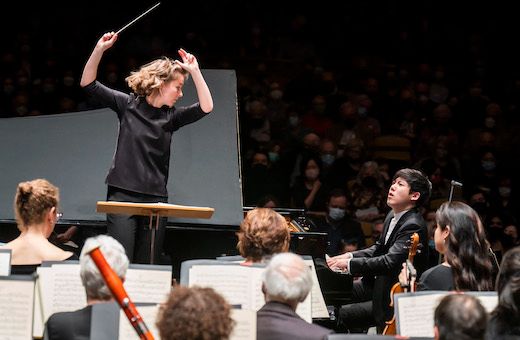It’s a tough time to be a Russian conductor. The press release begins: “Out of regard for the current global situation, and following discussions with Tugan Sokhiev, it has been mutually decided that Mr Sokhiev’s performances with the New York Philharmonic… will not take place.” He was replaced for these performances by Anna Rakitina, herself the daughter of a Ukrainian father and a Russian mother, and currently the Assistant Conductor of the Boston Symphony Orchestra, making her Philharmonic debut and seemingly enjoying herself immensely.
This was my first time hearing the Philharmonic at the Rose Theater, the second and smaller of their two temporary homes this season. It’s a tight fit, both physically and acoustically. The entire violin section had to vacate their seats in order for the piano to be rolled on for the concerto; and while the sound of the space does have some perks – the bass section and tuba had the kind of leg-rattling presence one normally associates with subwoofers – loud passages tended to blur into an indistinct sonic mass, and the loudest were on the verge of painful.
The program began with Lili Boulanger’s D’un matin de printemps (Of a Spring Morning), one of the last pieces Boulanger completed before dying at age 24. Her older sister Nadia is well-known as the guru to a generation of early 20th-century composers, but Lili was the first woman to win the Prix de Rome. The piece itself is charming, layering a Ravelian harmonic language with contrasts between lyrical lines and propulsive staccato accompaniments. Her orchestration is marvelous and subtle. There is more drama in the piece than I associate with spring mornings, though, with some oceanic depths and a goosebump-raising climax.
I had actually not been looking forward to Rachmaninov's Piano Concerto no. 2 in C minor, to my mind one of those pieces that’s long been so over-exposed as to deserve a few decades off. But as it turned out, Rakitina and pianist Haochen Zhang (making his own subscription debut) delivered a thoughtful version with minimal rubato and mostly shorn of sentimentality, a fresh look from young eyes. From both soloist and orchestra, the hanging dissonances that traditionally speak of yearning and heartache instead felt like floating, or the flapping of wings while soaring. Virtuosity aside, this endowed the piece with an earnest sincerity. Zhang emphasized the piece’s athleticism, exploiting the full dynamic range of the piano from ghostly pianissimos to violent climaxes. If the virtuosic figuration was not always as crystalline as it might have been, I for one considered it a fair trade. Zhang’s encore, the Horowitz Carmen Variations, was bouncy and dancing, playing to the same strengths.

Rakitina shone in the more rhythmic passages of Prokofiev's Fifth Symphony, especially in the second movement Allegro marcato. The accents here in both melody and ostinato were so emphatic as to be rude, almost grotesque, which was fantastic fun; when that material returned slowly at first after the more lyrical middle section, I wrote down “Monsters!” The Adagio sostenuto third movement, while conjuring eerie landscapes in its quieter moments, could have benefited from a more flexible approach; the articulation between sections often felt perfunctory. But the sense of headlong momentum and turbo-charged rhythmic drive in the finale made for an irresistible climax to a notable evening.


